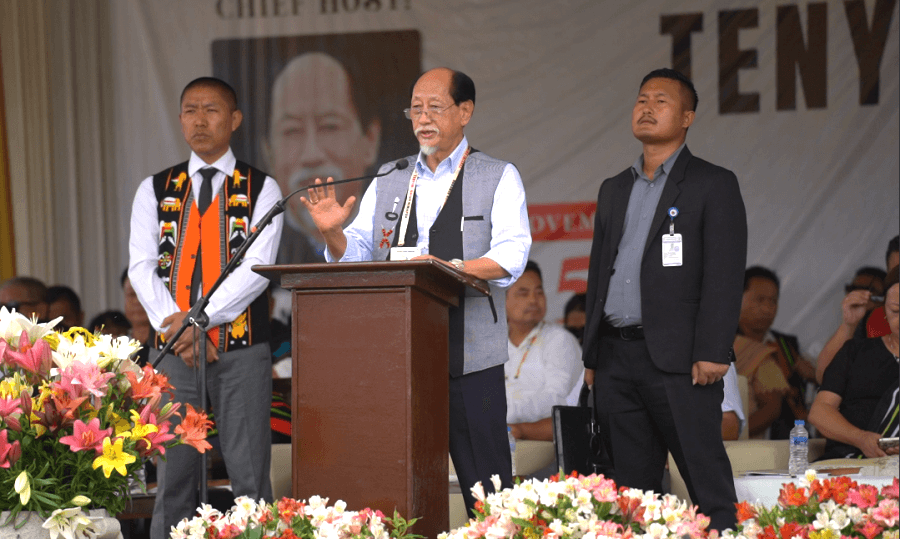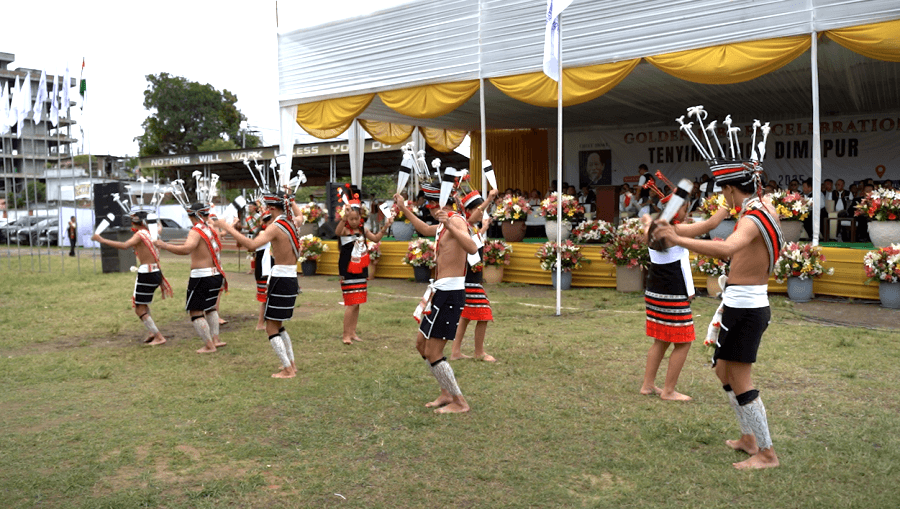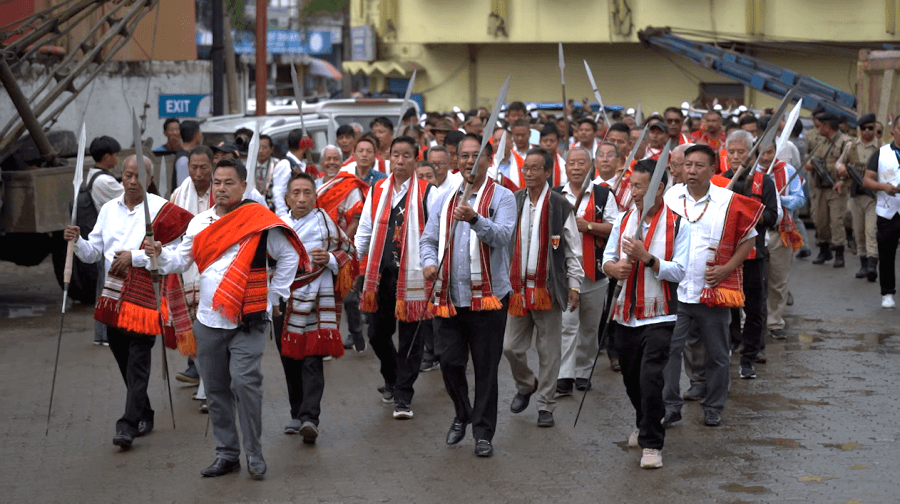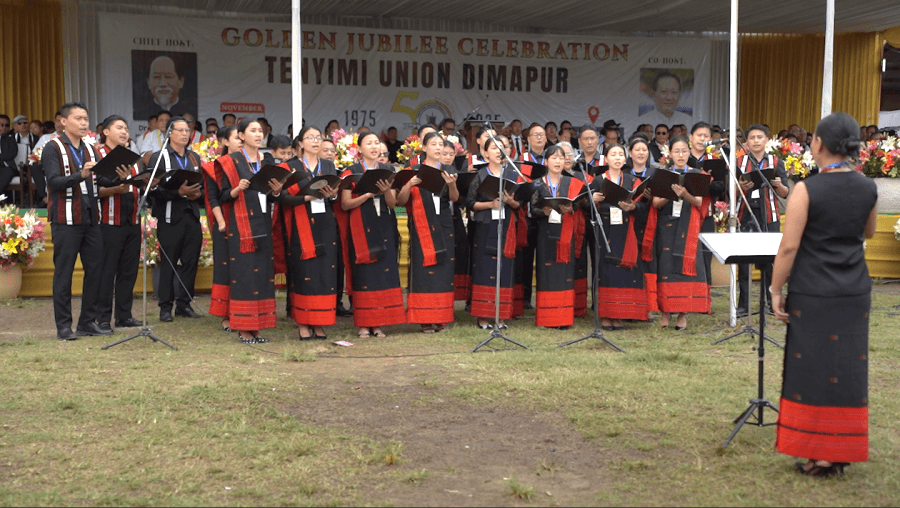MONDAY, DECEMBER 08, 2025
- Home
- At TUD jubilee, Neiphiu Rio links Tenyimia unity to broader Naga cause
At TUD jubilee, Neiphiu Rio links Tenyimia unity to broader Naga cause
Chief Minister Neiphiu Rio urged unity among the Tenyimia people at the TUD golden jubilee in Dimapur, linking their solidarity to the broader Naga cause.
Share

DIMAPUR — Chief Minister Neiphiu Rio on Wednesday called for unity and renewed purpose among the Tenyimia people, urging them to rise above divisions and build a shared, prosperous future for all Nagas.
Speaking as the chief host at the golden jubilee event of Tenyimi Union Dimapur (TUD) at the DDSC Stadium, Rio congratulated the organisers for successfully hosting the mega celebration.
He said that the Tenyimia people and the areas they inhabit are among the best in Nagaland, with Kohima serving as the capital and Dimapur functioning as the commercial hub.
He paid tribute to the visionary leaders and pioneers who, through their sacrifices and guidance, have shaped the Tenyimia community over the past five decades.

The chief minister stressed the importance of unity and brotherhood among the Tenyimia family, noting that their bond has grown stronger over the years. He expressed confidence that the golden jubilee event would further strengthen their spirit of togetherness.
According to him, the first and most important institution is the family; followed by the clan, the tribe, and the community.
‘As a major group, if we remain united, we will send a positive message to our Naga brothers. This unity will lead to greater understanding, cooperation, and peace in our land,’ he said.
Also read: Regional reboot: North East leaders chart course for unified political future
Reflecting on Naga history, Rio said that although the British considered the Nagas “primitive,” they also recognised their strength, rich culture, traditions, and democratic village life.
“The British brought Christianity, education, and governance, which helped us progress. Today, as a conscious and responsible people, we must uphold the law of the land while preserving our values,” he added.

Calling on the people to rise above “individualism, clanism, and tribalism,” Rio urged the community to embrace “Nagaism”—a spirit of broad-mindedness and unity among all Nagas.
The chief minister reminded that the British rulers had also extended protection to certain Naga areas, even as the Naga people today remain divided across four states—Nagaland, Manipur, Assam, and Arunachal Pradesh.
Even within Nagaland, he observed, regional bodies such as the ENPO, CNTC, and TPO (Tenyimia People’s Organisation) reflect internal divisions. He maintained that it was time for the Nagas to move forward with a shared sense of purpose, underscoring that unity among the Tenyimia family could serve as a foundation for achieving broader Naga solidarity.
Read more: In Step for Change: Red Run 3.0 and the shared dream of a stigma-free India
He recalled that during British rule, the Bengal Eastern Frontier Regulation Act of 1873 was enacted, introducing the Inner Line Regulation—now known as the Inner Line Permit (ILP)—to protect the Naga people’s land, culture, traditions, and customary laws.
After joining the Indian Union, the Nagas sought to preserve these safeguards, which led to the inclusion of Article 371(A) in the Constitution, granting them the constitutional right to uphold their heritage and customary practices.
He observed that Nagaland is currently in a period of transition, facing both internal and external challenges. Article 371(A), he noted, has come under judicial scrutiny following a suo motu case concerning land ownership and resource rights.

While other northeastern states enjoy protections under Articles 371(B) to 371(J), only Nagaland holds the unique constitutional provision affirming that land and its resources belong to the people—an issue that remains contested in court, he said.
Rio pointed out that the state sits on rich reserves of petroleum, natural gas, and minerals, yet internal divisions and a lack of unity have hindered the people from benefiting from these resources.
Despite being rich in potential, he said, Nagaland continues to lag in real development. He added that the same lack of unity has weakened efforts to resolve the Naga political issue, which has fragmented into multiple factions over time.
He cautioned that such divisions may serve the interests of those who wish to maintain control by keeping the people divided, reiterating that unity remains the ultimate goal and the only viable solution.
On the Inner Line Permit system, the chief minister stated that the state government has already issued clear guidelines for its implementation, stressing that responsibility for its effective enforcement rests not only with the government but also with every citizen and institution working together in cooperation.
WATCH MORE:
On the issue of indigenous rights, Rio elaborated on the Registration of Indigenous Inhabitants of Nagaland (RIIN), stressing that it was introduced to safeguard the rights of the indigenous Nagas.
He maintained that villages hold the ultimate authority to certify the indigenous status of individuals and warned that issuing false certifications would be treated as a criminal offence.
He added that over the years, some non-Nagas have wrongly obtained indigenous inhabitant certificates. To prevent this, proper verification and enumeration are essential, he said.
The chief minister, however, remarked that four tribes—Kuki, Kachari, Garo, and Mikir—had declined to participate in the enumeration process and subsequently obtained a stay order from the High Court.
He clarified that the court does not have the authority to issue or certify indigenous status, which can only be determined by the people themselves through their traditional and community-based processes.
Further, Rio reminded that managing Dimapur well was key to the progress of Nagaland as a whole, as the city represents a “miniature Nagaland and India” where all tribes and communities coexist.
To ensure the survival of the Naga people and resolve long-standing issues, he said that it was crucial to strengthen Tenyimia unity and brotherhood.
Deputy Chief Minister TR Zeliang, who attended as co-host, said that the jubilee was not only a celebration of 50 years of the union’s journey but also a time to reflect on the shared history and brotherhood of the Tenyimia people.
He said that the Tenyimia family comprises several tribes sharing close ethnic, linguistic, and cultural ties bound by mutual respect and cooperation.
“Unity should not merely be symbolic but should be based on preserving our identity, strengthening our voice, and advancing our collective development,” he said.
Former Chief Minister and President of Ura Academy, Dr. Shürhozelie Liezietsu, delivered an address in Tenyidie, while Losii Dikho, MLA of 48 Mao A/C, Manipur, also shared brief remarks.
Chief Minister Rio unveiled the golden jubilee monolith at the Tenyimi complex.

